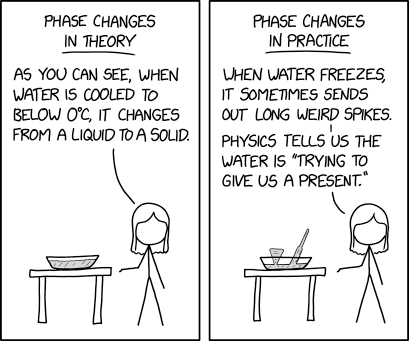No, it's angry you didn't give it a little jacket, now it's very cold and angy, so it's trying to stab you.
xkcd
A community for a webcomic of romance, sarcasm, math, and language.
Fuck that, ice comes in over 25 different structural types or phases, the most recently discovered was this year. We still don't know jack shit about jack shit:
We recently figured out why ice is slippery. Normies make it seem like all that's left to learn is at the fringes, but it's not. Our gaps in knowledge are everywhere. Even you can be an explorer!
I assumed it was because of a thin water layer that makes you essentially hydroplane when you step on it, am I even close?
Edit: Yes, but also no.
More akin to marbles on a floor or a table shuffleboard setup!
.
It reaches out
113 times a second
Doors and corners
That's where they get you
About our extended car insurances
Reality: when water is cooled below 0 °C, it freezes... sometimes
Also, even if it does nucleate, it only freezes if enough heat is removed from it to allow for the phase change to occur.
Me: you've been in the freezer for hours now, please freeze Supercooled water: how bout nah

I have seen photographs of this, but have never seen it in person. I wonder what special conditions are necessary for this to happen?
I had a spike like protrusion in one of my icecubes from a regular ice cube tray you place in the freezer.
But couldn't tell you why though
It was trying to give you a present.
Clearly. And I took it with grace and added it to my rum.
My hypothesis is that the freezer motor has to be right at the freezing point and the tray has to have few nucleation points such that when a small spek of water freezes the phase change disperses enough heat to prevent them from immediately following suit, the small flake of ice then rises to the surface. As it continues to cool, further freezing is more likely to occur in the existing crystal. Through a combination of ice's buoyancy and the surface tension of liquid water, the crystal gets pushed upward compared to liquid water.
I wonder if the fridge motor's vibration plays any role on where the fingers form (due to resonance patterns).
